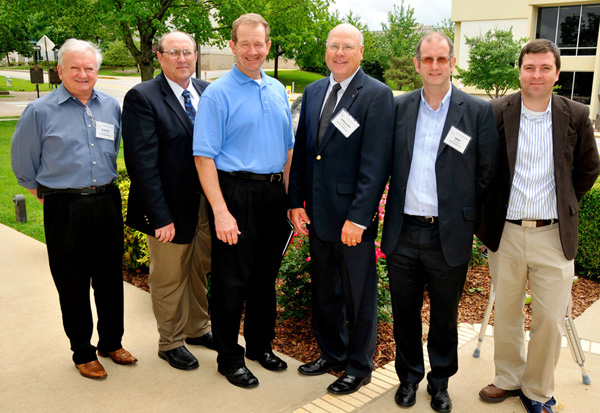
FAYETTEVILLE, ARK. -- The annual Industry Alliance Meeting of the University of Arkansas Division of Agriculture's Rice Processing Program May 25-26 had a cosmopolitan flavor with keynote speakers from England, Brazil, Fayetteville and Pocahontas, Ark.
The program in the John W. Tyson Building auditorium had a record attendance of about 100 persons representing sponsoring companies from seven countries and 10 states. The sponsors provide support for rice processing research along with the Arkansas Rice Research and Promotion Board.
Division of Agriculture research was presented that identified high nighttime temperatures as the cause of record low rice grain quality in 2010.
Terry Siebenmorgen, Rice Processing Program director and University Professor of Food Science, said variation in grain quality from year to year and location to location is a long-term research topic.
Head rice yield, which is the yield of whole kernels after removal of the hull and bran, was the lowest on record in all Delta rice-growing states in 2010, according to the U.S. Department of Agriculture. The average daily temperature from June - August 2010 in Central Arkansas was the highest on record.
The critical "grain-filling" stage of rice kernel development occurred in many rice fields when nighttime temperatures were at historically high levels, Siebenmorgen said.
Keynote speaker Greg Baltz of Pocahontas, a Randolph County rice grower, described his on-farm rice drying and storage system, which is largely based on Siebenmorgen's research. Baltz was a classmate of Siebenmorgen's at the University of Arkansas and has a degree in agricultural engineering.
Siebenmorgen's "glass transition hypothesis," which describes the change in rice kernels from a brittle, glassy state to a rubbery state when heated, was the basis for Baltz's system. Kernels can fissure, making them prone to breaking during milling, if not properly tempered to allow a gradually transition from a rubbery state back to a glassy state during and after drying.
Baltz credits his system with allowing him to dry a large quantity of rice in a timely manner and achieve consistently high milling yields of rice he delivers to the rice mill, which earns him a higher price.
Keynote speaker Nick Wilkins of Buhler Sortex Ltd., a London based supplier of equipment for processing grain and other food and non-food products, said demand for higher quality rice and specialty products will likely grow as consumers in developing countries become more prosperous.
More affluent consumers will be more interested in nutrition and food safety and might increasingly demand "traceability" of food to its source through technologies such as radio frequency identification (RFID), Wilkins said.
Another keynote speaker, Justin Patton of the University of Arkansas RFID Research Center, said the technology exists to trace a package of rice to its source.
Buhler Sortex has a system for making reconstituted, fortified rice from rice flour, Wilkins said. It is an example of innovation driven by the need to add value to co-products such as broken kernels, rice bran, bran oil and hulls, he said.
Flavio Lazzari, a rice industry consultant based in Brazil, said production and processing of rice, other grains and soybeans are rapidly increasing in South America.
Innovation in rice processing in South America is driven by high energy costs and the challenge of controlling insects in stored rice, Lazzari said. New rice mills have sophisticated systems for burning rice hulls and wood to provide energy for mill operations, he said.
Topics
Contacts
Howell Medders, Coordinator
AGCS
575-5647,